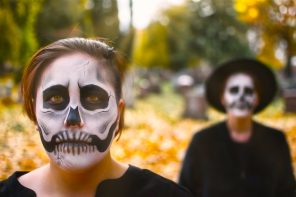A handful of conservative groups are frothing at the mouth over the current season of American Horror Story. But it may not be over the sex or the violence, or even the sexy violence and violent sex; it may just be that they’ve grasped the show’s theology, or rather this season’s anti-theology, of the living dead.
American Horror Story: Hotel has so far fooled most horror fans. Some feared that Lady Gaga would, in a very literal fashion, steal the show from us that’s become much beloved for its boundary-pushing, genre bending insanity. But, even that very meta-moment in which she portrays a century-old vampiress riding nearly nude into a 70s Studio 54-style club on a giant horse like a goth Lady Godiva, hasn’t epitomized the season’s eye-popping psychosis.
No, it’s the flumes of bloody ichor (mixed with more appealing bodily fluids) staining sheets cheerfully washed by a ghostly maid that have been the real showstoppers. Ryan Murphy, pop music impresario and producer of the sugary twee Glee, currently produces the most gutbucket, blood-drenched gore-fest that television has ever seen. So far, it’s the best season yet.
Past seasons certainly inflicted some fairly can-they-even-do-that-on-basic-cable moments on the tender-hearted. Still, this time around there’s plenty going on in just the first episode that competes with the Minotaur sex of yesteryear. Ghosts in rubber bondage suits now seem so 2011. Lady Gaga somehow managed to upstage herself in an early scene that opens as a highly stylized outdoor viewing of Nosferatu and proceeds to an ominous foursome that ends with an eroticized throat-ripping bloodbath.
Conservative media critics have predictably gone on a bender of outrage. The Parent’s Television Council (deserving of an award for “name that sounds most like a lobby group dedicated to creating moral panic”) has called season five “the most vile yet” and described the first episode as containing “an unbelievably explicit combination of sex and violence.” They aren’t wrong on the last point.
But that’s not the real issue. Newsbusters (who, according to their masthead make “combating liberal bias” their mission) defines what really disturbs traditionalists. Dylan Gwinn, writing for the site after the first two episodes ran, couldn’t decide at first if he were angrier that the series brought religion into the mix or that it seemed to criticize the early twentieth-century oil and coal industry. The brief review closed with an obtuse attack on “environmentalists,” the term itself making it seem as if the author just recently heard about a conspiracy called Earth Day.
Gwinn devotes much of the article to the show’s alleged attack on God and religious faith, even as he worries that Murphy makes fun of turn-of-the-century capitalism. Gwinn’s actually on to something when he takes note of this season’s bloody massacre of religious iconography. Even the opening credits, always a work of terrifying art in and of themselves, intersperses ghoulish images of restless, hungry and sexualized death with brief flashes of the Ten Commandments.
Then there are the monsters themselves—or, at least, the monsters we’ve met so far. Season five might become known as the “vampire season” of AHS, so it makes sense that religion plays such a substantial role in the story line.
Vampires are the perfect monsters to invoke the terrors of religious dread. The vampire embodies the most Promethean conceptions of monstrosity of any of the genre’s stock characters (excluding perhaps the mad scientist). They frequently appear, along with zombies, as repudiations of notions of Providence, eternal life and even of the existence of God himself. It’s really no surprise that James Patrick Marsh (played by Evan Peters), our bloodthirsty oilman who may have married a vamp, makes it his mission to “kill God.”
The dark underbelly of Christianity, impregnated with a thousand skittering anxieties about its own claims, created the vampire, just as it created the cultural nightmare of the witch. The Strigoi in Eastern Europe began as a terror of creatures that are quite literally anti-christ. They live forever, created out of pain and suffering but reborn into a glorified reality, a kind of open mockery of Christ’s resurrection. A line appearing in both the Hebrew and Christian scriptures, “the blood is the life,” has taken on new meaning in vampire fictions ranging from its repetition in Nosferatu (1922) to a thousand written and cinematic vampire stories since.
I mostly teach the history of twentieth-century horror to my college students though I have one class, a history of monsters of the ancient world, that contemplates the roots of the modern genre. These roots run deep in the world’s religious systems. I, and I hope my students, are often struck with how Christianity created a world of poisonous, deadly creatures with which to populate its mythology while other religious cultures managed to make their monsters creatures of wonder.
So, for example, medieval Christianity imagined the dark places of the earth filled with dragons and venomous serpents, demonic creatures that mirrored the Great Red Dragon of the Book of Revelation. Meanwhile, in South Asia, the naga—partially human, partially serpent—became bearers of good fortune. In Buddhism, a cobra-like naga named Mucalinda sheltered Gautama during his awakening under the bodhi tree. In China, dragons became, not beasts to be slain, but embodiments of Tian/T’ien, the very balance that brought cosmic harmony to the universe.
Such concepts are mostly unknown to Western European and West Asian monotheisms. Monotheism exhibits a peculiar talent for creating monsters of moral degeneracy, horrors of perversity. The idea of one God creates irresolvable tensions, raises questions about the source of suffering in a world created by a Being both omnipotent and allegedly full of compassion. Monsters, Christianity’s Satan lurking in the shadows behind them all, have been one way that monotheistic thought has tried to bridge the gap between its claims and our reality.
I’ve written critically in the past about Ryan Murphy’s lack of interest in exploring the issues he consciously raises. He skated rather simplistically over everything from issues of race in AHS: Freak Show (season four) to real American historical horror in more or less every season. He introduces these themes only to schmaltz it all up. This may be a bit like complaining that a snickerdoodle is not panna cotta with almonds; his work can, and probably should be, read as purposefully light and superficial.
Given this track record, there’s no real reason to believe we’ll get a true aesthetic meditation on religion and its monstrosities from Hotel. However, evangelical media watchdogs are straining at their leashes this season. Perhaps behind all the fretting about sex and violence there lies the realization that AHS: Hotel reveals some of monotheism’s dirty little secrets, set to a top-forty soundtrack.





